Charlottenlund Curriculum
Stepping Stones Preschool - A Nurturing Villa Nursery in Charlottenlund
Stepping Stones Preschool – Charlottenlund is a warm and welcoming nursery/preschool located in a beautiful villa near Bernstorffsparken. We care for 35 children divided into two groups: the Polar Bears (ages 1–2) and the Tigers (ages 3–5). Our child-to-teacher ratios are 1:3 in the Polar Bears and 1:6 in the Tigers. Children start and end the day together, while from 9:30 to 15:30 they are in their age groups. During activities, they are further divided into small groups of 6–8, depending on the activity.
Stepping Stones preschool offers a well-rounded curriculum based on the common educational foundation and the six curriculum themes from the Danish strengthened pedagogical curriculum. We focus on the importance of meeting each child as an individual, recognizing their unique potential and learning styles. Our approach caters to children’s interests and supports a variety of educational choices to help them grow and express their talents.
We support children in making their own choices, both individually and in groups. Education is seen as a natural process that develops through interaction and experience, not just by hearing words. This joy of discovery builds a strong foundation for the child’s self-esteem.

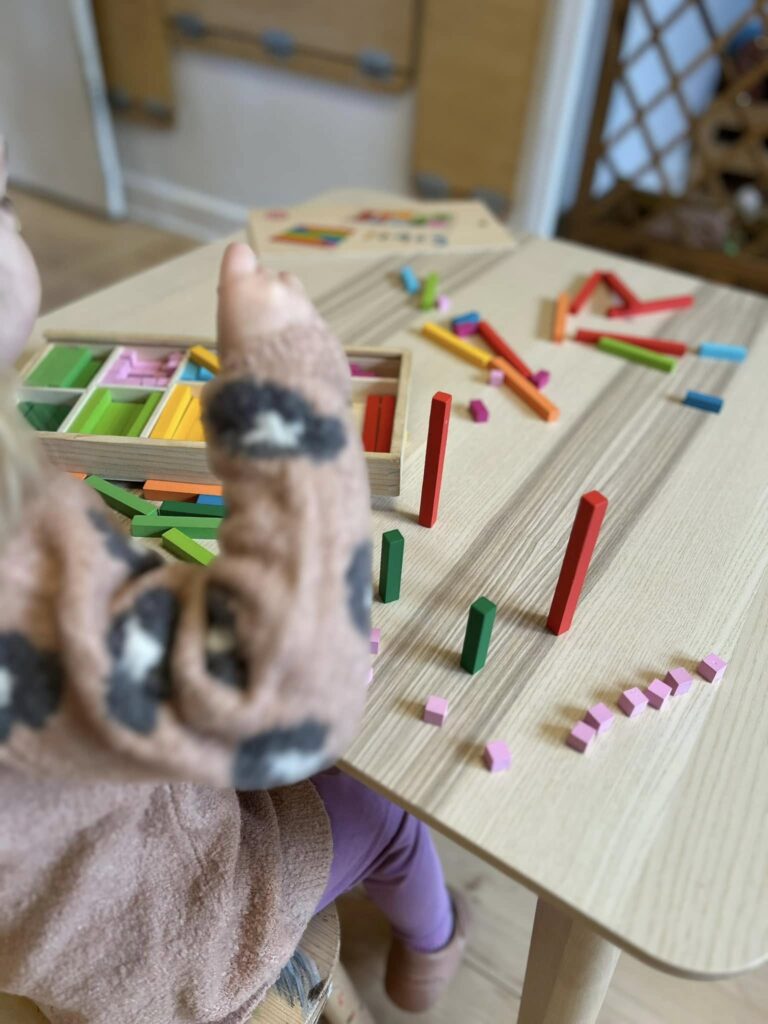
Learning Through Play and Supportive Environments
Preschool-age children are naturally active, curious, and learn through play and hands-on activities. They express themselves through drawing, building, movement, painting, pretend play, and music. It is essential they have enough opportunities for expression. By integrating these into our curriculum, we promote their learning and development.
We believe learning and play are interconnected. Creating supportive learning environments is crucial, especially for children in vulnerable situations. We provide daily breaks with toys, puzzles, drawing, and story time to help them unwind. Our structure includes educational components that allow for individual engagement. Our framework is designed to support individual growth.
Partnering with Parents to Support Early Development
We maintain close communication with parents through meetings, recognizing them as the child’s first teacher. Parents are encouraged to actively participate in our community through events and celebrations, playing a key role in the children’s development.
Preschoolers are energetic and eager to explore their world. Their capacity to learn and develop at this stage is vast, influenced by every experience, relationship, and adventure. We provide space and opportunities to explore, fostering imagination and developing motor, cognitive, language, and social skills that are essential for future development.
We work with six pedagogical themes:
- Comprehensive personal development
- Social development
- Communication and language
- Body, senses and motion
- Nature, outdoor life and natural phenomena
- Culture, aesthetics and community
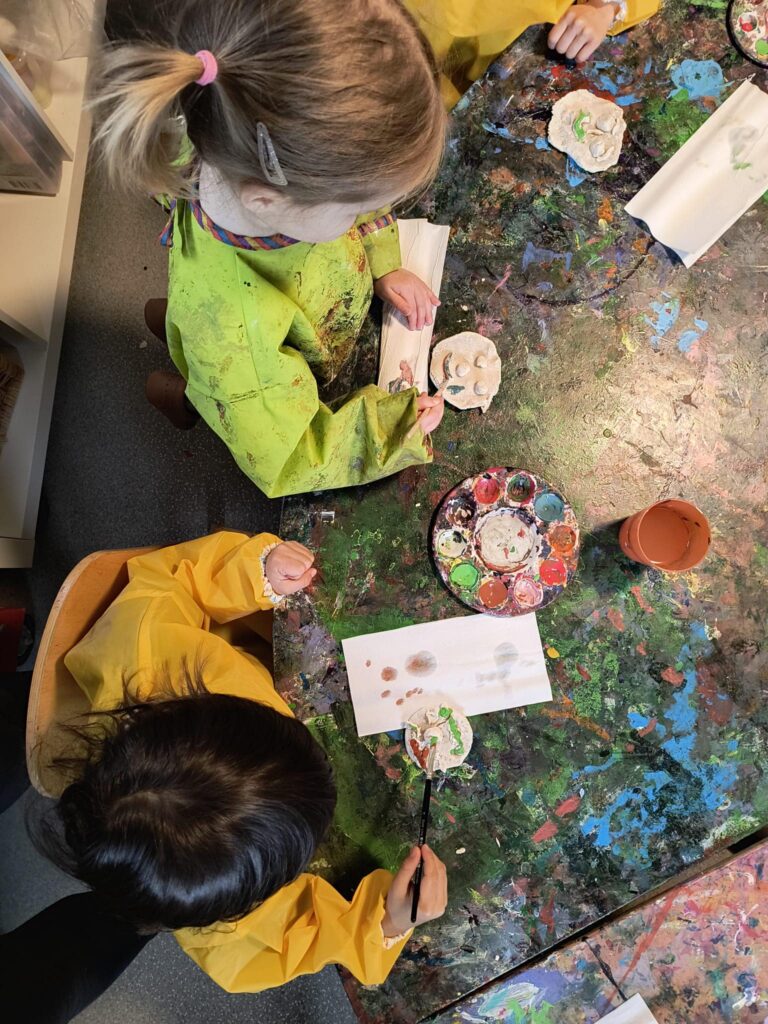
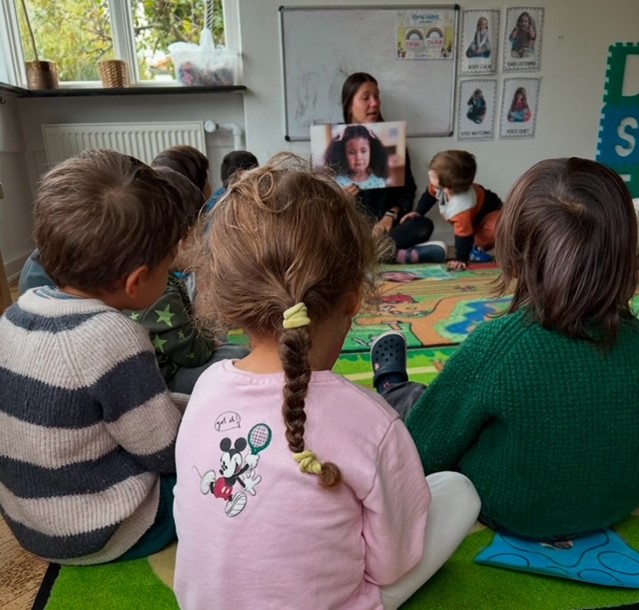
Comprehensive personal development & Social development
At Stepping Stones, one of our greatest strengths is our size and teacher ratio. As a smaller school, both the children and teachers are familiar with each other, which helps us cultivate a sense of community. This family-like atmosphere is one of our core values, and we believe it makes all the difference in providing a nurturing and friendly environment for our students.
From early in the morning, children greet each other and the teachers in a warm way, showing trust and affection. Our priority is to provide a secure and comfortable space so that we can achieve the best possible conditions for the development of the individual child. Throughout our daily activities, we make sure that every child has the chance to demonstrate their abilities and we praise their efforts and actions.
We encourage the children to express their own ideas and to describe themselves positively. Furthermore, we encourage them to interact cooperatively with their peers while playing, reading, sharing materials and doing activities together. The child’s feelings must be understood and recognized, and children need to feel accepted. We recognize the child, his/her resources and feelings and we allow them to participate freely to strengthen the child’s interests and emotions.
For example, we do this by being flexible in relation to planned activities. Moreover, we guide the children towards confident self-expression in music, meanwhile gaining physical coordination and control of their bodies, voices, and emotions. Being an international preschool and having many different nationalities in our classrooms, we understand and recognize the children’s cultural diversity.
Goals & Achievements
- Emotional Expression and Comprehension: The child displays curiosity regarding their own and others' emotions and feelings. They can recognize and label emotions and their triggers in themselves and others. In typical situations, they express themselves appropriately using words and actions, and they respond to others' emotions by helping and showing empathy.
- Initiative and Persistence: The child takes pride in their developing skills and abilities. They demonstrate initiative by initiating activities based on their interests, can engage in and prolong activities, and can return to an activity after a break. They seek adult assistance when unable to find solutions.
- Willpower and Self-Control: The child understands and follows agreements, maintains politeness and peace, and demonstrates self-control in their interactions with others through their words and actions.
- Self-Awareness and Self-Esteem: They develop a sense of self, understanding their past, present, and future selves. They perceive themselves as part of a family, group, or community, displaying confidence in their abilities and skills. They speak positively about themselves, recognizing their rights to play and belong.
- Readiness for Challenges and Problem-Solving 3: The child shows readiness to face challenges and solve problems. They can identify and name challenges, problems, and obstacles independently or with others, seek solutions to overcome challenges, make decisions appropriate to the situation, and evaluate the outcomes of their choices.
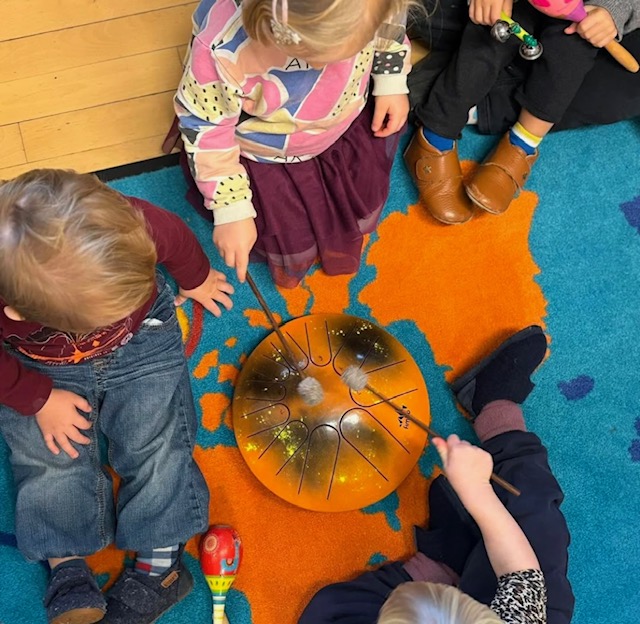
Language & Communication
Through activities such as story time, ‘book show-and-tell’, puppet shows, singing rhymes, games and playing, children grow an interest in language and books. Story time is an important activity in our curriculum as we believe it is very beneficial to promote their listening skills, comprehension and vocabulary as we ask questions about the story and talk about it afterwards. Children also gain confidence and become accustomed with the language as they are encouraged to listen and share their opinions and experiences throughout group and individual activities such as circle time.
We encourage the children to use sentences instead of individual words as they become more and more familiar with the English language. In addition, we use different tools, materials and methods to introduce the children to the first pre-writing and reading steps, such as learning letter recognition, formation and sounds. The children learn and practice language using fun and engaging tools (playdough, sand, paper, pompoms, trays, and much more).

Goals & Achievements
- The child displays curiosity in both verbal and non-verbal communication methods.
- Shows an eagerness to listen and comprehend others.
- Capable of understanding different forms of speech and meanings appropriate for their age.
- Expresses thoughts, feelings, and experiences through various communication methods.
- Actively engages in conversations and storytelling.
- Demonstrates writing skills by copying words and writing their own name.
- Engages in imaginative and rule-based games both independently and with peers.
- Follows the rules of different games effectively. The child exhibits trust in teachers, respects them, feels at ease in various environments, learns from them, shares thoughts, and understands how to interact with unfamiliar adults. Shows kindness towards peers, embraces differences, forms friendships, and comprehends the impact of their words and actions on themselves and others.
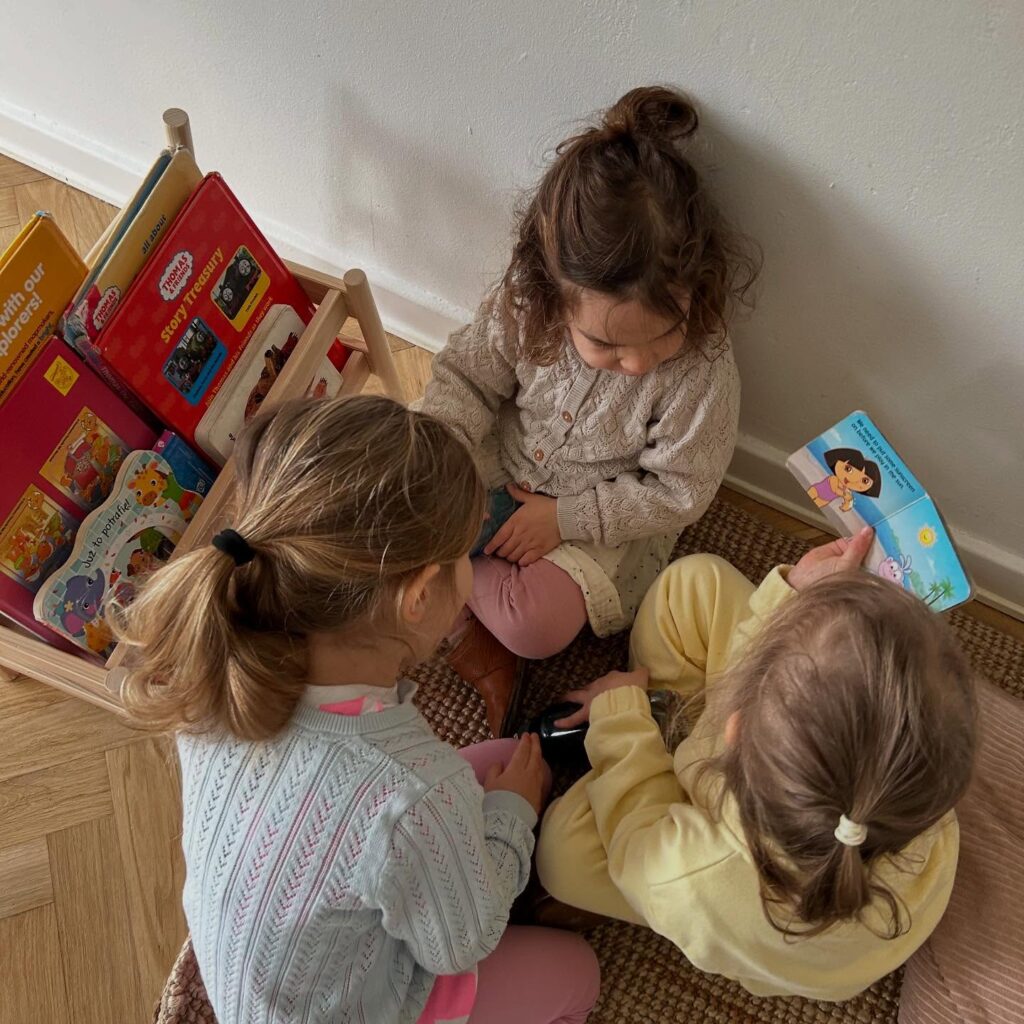

Nature & Science
As part of our curriculum, we focus on themes and activities that teach children about nature, the weather, the animal kingdom and the human body. We use our daily practices to explain why nature works the way it does while children are experiencing it—for example, why it rains or how plants grow. We show children how to take care of nature, trees, plants, flowers and animals, and involve them in hands-on activities such as watering plants and helping with the outdoor area.
In addition, we incorporate recycling activities and create art projects using various materials like boxes, plastic bottles, and natural elements. Field trips also play an important role in the learning process, allowing children to experience and learn directly from nature.
Goals & Achievements
Engaging in outdoor activities can significantly enhance children’s physical abilities, including increased strength, improved coordination, and enhanced flexibility. Furthermore, positive interactions with nature can cultivate a sense of environmental respect. Science experiments provide a valuable opportunity for children to explore the world, encouraging a healthy level of skepticism and problem-solving skills.
- Identifying and explaining social and natural phenomena, describing personal attributes, living environment, family, and surroundings, showing interest in technology, and actively learning to utilize it.
- Developing the ability to learn and take charge of their learning activities, displaying curiosity, engaging in self-initiated and suggested tasks, actively pursuing goals, observing, reflecting, and adjusting their activities and outcomes.
- Actively investigating and displaying interest in personal, social, cultural, and natural surroundings, demonstrating the ability to use research methods such as observation, experimentation, and questioning, reflecting on observations, discoveries, feelings, and experiences.
- Recognizing and describing known social, cultural, and natural elements, using this knowledge in games and other activities.

Culture, aesthetics & community
Aesthetic experiences give the child the opportunity to share, reflect and understand their own experiences and thoughts. Curiosity, sensation, play and imagination are part of the aesthetic learning process and can create new perspectives and views that become new knowledge and new learning. Therefore, the child must be supported in creating cultural expressions in a learning environment that involves the child in the process, appreciates engagement and construction, as well as the child’s own experimental expression.
The child should feel that his/her way of managing time and space, play, friendships and conflicts is met with curiosity and respect. At Stepping Stones, we encourage a democratic environment by promoting dialogue with the children and giving them the right communication skills. Children learn to listen, respect others’ opinions, to express their own opinion and wishes and develop both as individuals and as members of a society
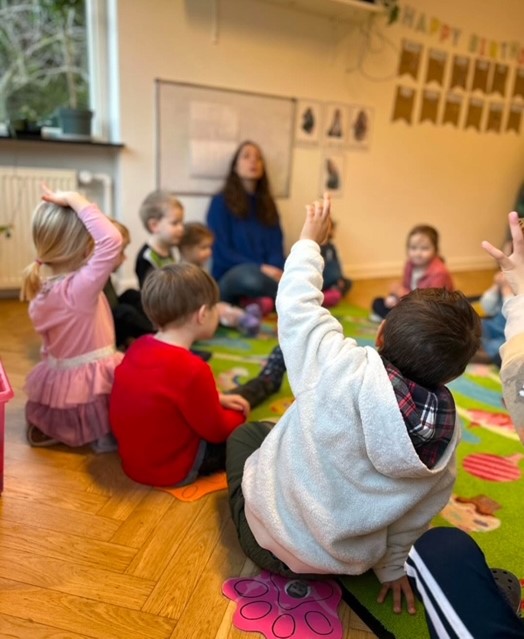
Goals & Achievements
Focusing on culture within diverse learning settings allows children to explore different aspects of themselves, express their thoughts in various ways, and develop a deeper understanding of their environment.
- Engaging experience and imagination to delve into personal and others' ideas
- Discovering methods and tools to showcase originality
- Engaging in discussions with others Children strive to master the languages of art to the best of their abilities. They spontaneously and intentionally convey emotions, impressions, thoughts, and ideas using familiar artistic techniques. They identify their artistic interests and utilize basic artistic concepts to express their experiences effectively.
- Identifying and appreciating natural and cultural phenomena
- Reacting to and perceiving these phenomena
- Discussing aesthetic qualities based on personal understanding
- Sharing personal aesthetic encounters
- Enjoying both personal and others' creations Children authentically express themselves with a sense of adventure, always eager to delve into new concepts.
- Drawing on experience and imagination to explore personal and others' ideas
- Discovering ways to demonstrate originality and creativity in executing innovative concepts
- Engaging in discussions with peers


Body movement & Senses
In order to develop control over their large and small muscles, children are encouraged to use their body through physical activities and games, body movement and music, outdoor play, field trips and, through self-help practices such as going up and down the stairs, cutting fruits and mixing ingredients during cooking class. In addition, they gain autonomy and independence by doing regular tasks such as getting dressed, tidying up, setting up the tables for lunch, pouring water in their glass, serving the food on their plates and helping to clean up after themselves when needed.
We also promote their fine motor skills by teaching them how to hold the pencil, use age-appropriate scissors and do small manipulative activities such as building with Lego and playing with beads. As part of our curriculum, children also learn about fire safety, first aid skills, health, nutrition and hygiene.
Goals & Achievements
- Enjoys acquiring skills essential for a well-rounded daily routine.
- Prioritizes personal health and practices safety in the surroundings.
- Demonstrates independence in using the bathroom, dressing, eating with utensils, and tidying up.
- Makes healthy food choices, eats on their own, maintains personal hygiene, helps keep the environment clean, exhibits basic safety skills at school, and knows how to behave safely in various settings such as on the street, at home, in nature, and around strangers.

Evaluation
A good children’s environment is essential for learning and development. To achieve this, we consider different types of environments and perspectives. The physical environment supports movement, space, and hygiene, while both indoor and outdoor areas promote exploration and growth. The aesthetic environment—through thoughtful design and decoration—influences children’s experiences and behavior. The psychological environment shapes how children feel and interact, and is built on relationships, communication, and mutual understanding.
At Stepping Stones Preschool, we value each child’s individuality and encourage their sense of belonging by letting them help decorate their classrooms. Our small group sizes ensure more individual attention, and our monthly themes explore topics like relationships, nature, and cultural celebrations. We foster strong communication among children, parents, and teachers.
To maintain a high quality of education, we regularly evaluate our environment and teaching. This includes monthly staff meetings, an annual curriculum assessment, and collaboration with international schools to support smooth transitions. Each child receives a yearly assessment report to support their progress and guide the parent–teacher meeting.

My child then moved to the older class when she was 3 years old, the teachers in tigers are also amazing making the transition as smooth as possible. She is absolutely happy in the school and I would highly recommend any child that would like to have an international exposure to enroll in this school."
The place is very clean, organized, safe for the kids (there are always many teachers around, the kids are NEVER alone/unattended) and very cozy. It was the perfect welcoming place for both our daughters, at the time 5 and 1 year old. The oldest one learned how to speak English perfectly in 3 months (from scratch), thanks to Stepping Stones great teachers and because it's such an international environment with kids from all over the world. It's not only a welcoming place for kids, but also for parents.
We could build great friendships there, a real community that helps each other, which is so important when living abroad. Thank you, Stepping Stones and all the families, you are amazing!"
She is surrounded by a supportive environment and dedicated teachers and participates in various development programs every day.
At the beginning, she didn’t know English at all, but now she understands what they say and learns the language effortlessly through songs and games. Education on room cleanliness has also been carried out with excellent cooperation. I wholeheartedly recommend this institution."
The teachers care deeply about every child personally, the environment is friendly, encouraging natural curiosity and growth.
If you are looking for a place that your kids will love going to and you will feel at peace knowing they are not only looked after, but thriving, then this is it. (we have experienced both the toddler 1-3 YO and the pre-schooler 3-6 YO groups and have had equally positive experience)."
The teachers are very engaged and warm, and the school provides a diverse educational curriculum and nurturing environment so that my kid never wants to leave it. The preschool facilities are clean and cosy. Our experience has been exceptional, we highly recommend this preschool."
Their priority is always not to shake the child's self-confidence and to show respect as an individual. For example, all teachers communicate with the children at eye level and calmly as much as possible. It is definitely a peaceful and fun school."
The curriculum of the school is perfect, kids are enjoying to learn new things and developing new skills. I can't imagine better place for my son, highly recommended."
Thank you to everyone in Stepping Stones Charlottenlund"
